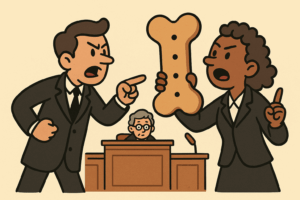
Free to Create, Free to Discriminate? Inside the 303 Creative Ruling Shaking Constitutional Law
On the last day of the Supreme Court’s 2023 term, a controversy over a wedding website that didn’t even exist set a pivotal precedent. In
Family & Domestic Relations law is one of the most emotionally charged areas of legal practice. Whether it involves child custody, divorce settlements, or the intricacies of spousal support, legal practitioners must navigate highly sensitive issues while advocating for their clients’ best interests. One of the most valuable tools in this area of law is the case study.
Case studies serve as windows into how legal disputes within families and domestic relationships have been resolved in the past. By studying the strategies and outcomes of these cases, lawyers can learn valuable lessons that help them provide better advice and representation to their clients. At The One Law Firm, we believe that understanding the importance of case studies and regularly reviewing them can enhance legal practices, improve decision-making, and ultimately lead to better outcomes for families involved in complex legal proceedings.
This article explores why case studies are invaluable in Family & Domestic Relations law, how they contribute to a more effective legal practice, and how our blog at The One Law Firm can help lawyers hone their skills through collaborative knowledge-sharing and case study analysis.
Family & Domestic Relations law covers a broad spectrum of legal issues, including divorce, child custody, adoption, and domestic violence, among others. Each of these issues has its own set of complexities, and often, lawyers are required to use both legal expertise and emotional intelligence to navigate them effectively.
Why Case Studies Matter in Family Law
Learning from Real-World Scenarios
Case studies offer a practical, real-world understanding of how courts, mediators, and legal professionals handle family and domestic disputes. Family law can be unpredictable, and understanding the nuances of past decisions helps practitioners anticipate possible outcomes. Case studies allow legal professionals to see the patterns in how judges approach cases involving custody, spousal support, and property division, as well as the strategies that are more likely to succeed.
Example: In child custody cases, the application of the “best interest of the child” standard can vary depending on jurisdiction, the child’s age, and the circumstances surrounding the parents’ relationship. Reviewing case studies that highlight how judges have interpreted this standard in the past can provide valuable insights into how a similar case might unfold.
Sharpening Advocacy Skills
Family law often requires sensitive advocacy, particularly when representing clients facing difficult personal circumstances. Case studies give lawyers an opportunity to review how different advocacy strategies played out in past cases. This allows attorneys to refine their strategies, learn what approaches tend to resonate with judges, and understand how to handle complex emotional situations with professionalism.
Quote: “In family law, you are not just presenting facts—you are addressing people’s lives. Case studies offer insights on how to advocate for your client while keeping in mind the emotional weight of the case.” — Karen Whitmore, Family Law Attorney, Whitmore Legal Group.
Improving Client Communication
Family law requires frequent and effective communication with clients who are often facing high-stakes emotional situations. Case studies provide an opportunity to learn from past experiences, including how to communicate difficult news to clients and how to manage their expectations throughout the legal process. By studying cases where client communication was particularly effective (or ineffective), lawyers can improve their own practices and ensure they handle client relationships with empathy and professionalism.
In the emotionally charged world of Family & Domestic Relations law, making informed decisions is essential for both the lawyer and the client. Case studies are critical tools for guiding decision-making because they provide:
Understanding Court Trends
Reviewing multiple case studies over time allows family law practitioners to recognize trends in judicial decision-making. For example, certain trends might emerge in how courts are handling custody cases involving older children, or how the division of assets is handled in long-term marriages. By staying informed on these trends, lawyers can better advise clients on how their cases might be resolved.
Example: In recent years, some states have seen an increase in joint custody rulings, reflecting a broader societal shift towards shared parenting arrangements. By examining case studies that discuss the rationale behind joint custody decisions, attorneys can better advise clients on how to approach these cases.
Informed Settlement Negotiations
Many family law cases are settled outside of court, and understanding past case outcomes is crucial for negotiating favorable settlements. By reviewing case studies, lawyers can learn what types of settlements were accepted in similar situations and use that knowledge to guide negotiations. Additionally, case studies help lawyers anticipate what might be acceptable to the opposing side, thereby increasing the chances of securing an advantageous settlement.
Quote: “I’ve found that the more case studies you read, the more insight you gain into how a judge or opposing counsel might view a case. This knowledge is invaluable when negotiating settlements for clients.” — Gregory Martin, Senior Partner, Martin & Carter Family Law.
Managing Risks and Avoiding Pitfalls
Family law cases often involve significant risks, particularly when emotions run high. Case studies allow practitioners to learn from previous mistakes and avoid common pitfalls. Whether it’s failing to properly document evidence, mishandling mediation processes, or making strategic errors during court hearings, case studies provide a roadmap for avoiding these common errors.
Example: A case study where a lawyer failed to present sufficient evidence in a child custody case can highlight the importance of thorough documentation. Similarly, a case where a lawyer’s failure to consult a child custody evaluator led to a less favorable outcome can serve as a cautionary tale for future practitioners.
Incorporating case studies into your legal practice requires more than simply reading through case files—it involves critical thinking, contextual analysis, and strategic planning. Below are some best practices for effectively using case studies in Family & Domestic Relations law:
Contextualize Each Case
While case studies are valuable learning tools, it’s essential to consider the context in which each case was decided. Factors such as the jurisdiction, the specific facts of the case, and the underlying legal principles must all be taken into account when drawing lessons. A case that was successful in one jurisdiction may not necessarily apply in another, especially if the local laws or precedents differ.
Cross-Examine Different Perspectives
Family law cases often involve multiple perspectives, including those of the parents, children, and legal professionals. Reviewing case studies from different angles helps lawyers understand the multiple dimensions of family disputes. Additionally, reviewing cases that were handled by different legal professionals can provide insight into the diverse strategies employed in family law.
Stay Updated
Family law is constantly evolving as societal values and laws change. It’s crucial for practitioners to keep up-to-date with the latest case studies and legal developments in the field. This ensures that attorneys remain informed about new trends, emerging issues, and best practices.
At The One Law Firm, we recognize the power of shared knowledge and collaboration. Our blog is designed to be a hub where Family & Domestic Relations law professionals can come together to review case studies, discuss trends, and share best practices. Here’s how our blog can support your professional development:
In-Depth Case Study Analyses
We will publish detailed case studies that break down key family law decisions, highlighting the lessons learned and offering insights into how they can inform your practice. These case study reviews will cover a wide range of issues, from child custody battles to divorce settlements and beyond.
Expert Insights and Best Practices
Our blog will feature contributions from seasoned family law professionals who will share their expertise and insights on the latest legal strategies, effective advocacy, and the best ways to handle family disputes. You will gain access to expert advice that will help you refine your own approach to case management and client relationships.
Collaborative Knowledge Sharing
The blog will also serve as a platform for you to share your own case studies, strategies, and professional experiences. Whether you’ve handled a particularly challenging case or discovered a new best practice, submitting your work will contribute to a growing body of knowledge that benefits the entire family law community.
Family & Domestic Relations law can be emotionally and legally challenging, but by engaging with case studies and sharing your own insights, you can sharpen your skills and improve your legal practice. Contributing to The One Law Firm blog will not only help you stay informed about the latest trends and strategies but will also provide an opportunity for you to give back to the community by sharing your experiences.
By participating in our collaborative community, you’ll build stronger connections with your peers, contribute to the legal field’s collective knowledge, and enhance your reputation as a trusted expert in Family & Domestic Relations law.
The importance of case studies in Family & Domestic Relations law cannot be overstated. By understanding past cases, learning from both successes and failures, and engaging with a community of like-minded professionals, you can elevate your practice and achieve better outcomes for your clients. At The One Law Firm, we are committed to providing a platform for collaborative learning, knowledge sharing, and professional growth.
We invite you to join our community, read our case studies, and contribute your own insights. Together, we can build a stronger, more informed family law community.
Endnotes
Karen Whitmore, Family Law Attorney, Whitmore Legal Group.
Gregory Martin, Senior Partner, Martin & Carter Family Law.

On the last day of the Supreme Court’s 2023 term, a controversy over a wedding website that didn’t even exist set a pivotal precedent. In

How a pet‑food lawsuit became the Supreme Court’s cleanest answer yet to a messy removal problem—and what it means for every litigator who plays the

How a herring boat fight rewired U.S. administrative law—and what it means for agencies, regulated industries, and your litigation strategy. On a Friday morning at

How an unpublished Massachusetts opinion is quietly rewriting the rules of fiduciary warfare—and what every planner, litigator, and trustee should learn from the fallout. The

By TheOneLawFirm.com **“The express purpose of [§ 208(9)(o)] was to eliminate tax loopholes concerning royalty payments.” — Judge Cannataro, *Matter of Walt Disney Co.*¹ Long before Disney+ ever streamed a pixel in

How Adolph v. Uber Re‑wired California’s “Sue‑Your‑Boss” Law—and Why Labor Lawyers Everywhere Should Care By TheOneLawFirm.com “An order compelling arbitration of the individual claims does